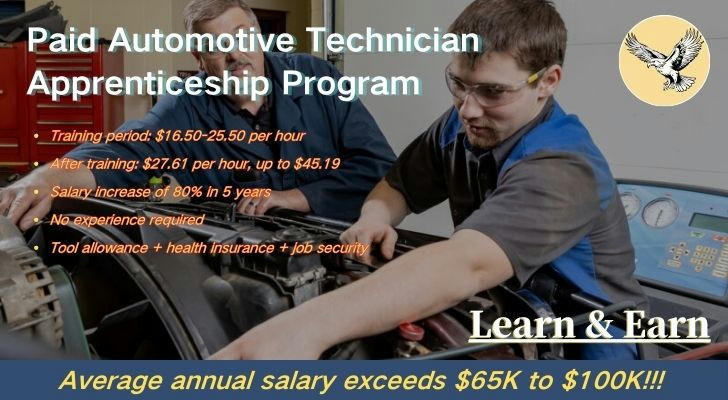Hourly Wage Up to $25 No Degree Required: U.S. Automotive Technician Apprenticeship with Paid Training, Launch Your High-Paying Career
Latest policy in 2025 / No degree requirement / Clear career path
The American Automotive Technician Apprenticeship Program offers $16.50-25.50 per hour, 40 hours per week, and no education requirement. During your training, you will receive a tool kit, a monthly stipend, and paid on-the-job training. Once certified, you will receive a nationally recognized credential and an average annual salary of over $65,000 (according to the U.S. Department of Labor).

Government-Industry Partnership: What’s the Future of Automotive Technicians?
The U.S. automotive industry is facing a critical shortage of skilled technicians.
According to the Texas Labor Bureau, Texas alone will need 5,000 new automotive technicians by 2028 (source: DFW Automotive Apprenticeship Group). Government-backed apprenticeship programs nationwide offer an “earn while you learn” model:
- Starting at $16.50/hour, with training hours counting toward certification requirements;
- Average annual salary exceeds $65,000, with top technicians earning up to $100,000;
- Versatile skills: Covers fuel vehicles, electric vehicles (EVs), and smart diagnostic systems, bridging manufacturing, repair, and renewable energy sectors;
- High job stability: Partner employers (e.g., new car dealerships) prioritize hiring graduates, with 85% of apprentices securing jobs directly;
- Accredited programs: Approved associations (e.g., U.S. Department of Labor Registered Apprenticeships), with subsidized classes—zero debt training.
What Benefits Can You Gain from an Automotive Technician Apprenticeship?
- Salary Growth: Start with zero experience—earn $45,000 in your first year, with over 60% salary increase within 5 years;
- Training Cost Coverage + Financial Support:
- Training costs covered by employers, plus:
- Toolkit (valued at $1,500);
- Monthly tool stipends;
- Paid time off and insurance benefits (dental, vision, life insurance);
- Training costs covered by employers, plus:
- Career Flexibility: Earn nationally recognized certifications to work across brands (e.g., Ford, Toyota);
- Future-Proof Skills: Master EV diagnostics and smart control systems, outperforming traditional industries in career competitiveness.
Real Case: From Grocery Clerk to Master Technician — John’s Career Transformation
25-year-old John once worked at a Dallas grocery store, earning only $12/hour. In 2023, he joined the DFW Automotive Apprenticeship Group (AAG), completing paid training ($23.5/hour) and online courses to earn U.S. Department of Labor certification in 8 months. Now employed at a local Toyota dealership specializing in hybrid vehicle repair, he earns $72,000 annually and participates in premium EV projects with monthly performance bonuses exceeding $1,000.
John says:
“This job helped me pay off student loans in two years and buy my first truck. Skilled blue-collar income is beyond imagination!”
Data shows 80% salary growth within 5 years for non-degree holders like John—skills rewrite life trajectories.
How to Apply for a Government-Industry Automotive Technician Apprenticeship?
Step 1: Define Your Career Path
Explore roles (e.g., diagnostic technician, EV repair specialist) via the U.S. Department of Labor’s Occupational Handbook.
Step 2: Match with Employers
- Direct Applications: Contact dealerships offering apprenticeships via platforms like Indeed;
- Agency Matching: Register with government-partnered programs like AAG for employer recommendations;
- Key Tip: Ensure a signed “training agreement” during interviews—mandatory for apprenticeship enrollment.
Step 3: Register the Training Agreement
After employer confirmation, submit to state apprenticeship offices (e.g., Texas Mechanics Association):
- Employer-provided training plan (hours and skill goals);
- ID and Social Security Number;
- High school diploma or equivalent (some states accept basic competency exams).
Step 4: Access Financial & Benefits Support
- Tool Stipends: $200–500/month for professional equipment;
- Online Courses: Learn diagnostics and EV principles via AAG;
- Health Insurance: Enroll in dental, vision, and life insurance upon hiring.
Step 5: Complete Training & Certification
- Earn While Learning: Work 40 hours/week + hybrid training (12 weeks/year in classrooms);
- Certification Exams: Pass ASE (Automotive Service Excellence) exams for a 20% average wage increase;
- Job Guarantee: Partner employers prioritize certified graduates, with 75% hired full-time post-graduation.
Beyond Government Programs: Other Training Providers?
- Automaker Programs: Ford and GM offer brand-specific training, starting at $42,000–$50,000/year;
- Community College Partnerships: Texas State Technical College (TSTC) “Co-op” programs count internship hours toward certification;
- Industry Associations: ASE Certification Centers partner with dealers for “fast-track” programs (90% job placement after 6 months);
- Nonprofits: SkillsUSA offers scholarships for low-income applicants, covering tools and exam fees.
Who Should Apply?
- Career Changers: Start from scratch—ideal for transitioning from retail, logistics, or low-wage sectors;
- Hands-On Learners: Love tinkering, problem-solving, and working with vehicles;
- Skilled Job Seekers: High industry demand shields jobs from economic downturns;
- Financial Need: Earn while training + apply for stipends to reduce living costs.
Low Barrier + High Reward—Automotive Technician Training is Your Golden Ticket to a Skilled Blue-Collar Career!
